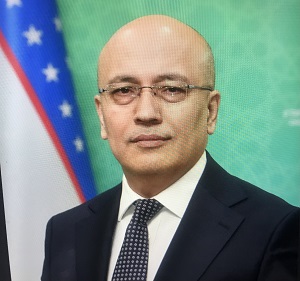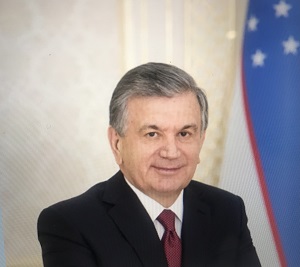Uzbekistan Prepares for Referendum on Constitutional Reform
By Elaine Pasquini


Furqat Sidikov |

President Mirziyoyev |
Washington: The Republic of Uzbekistan, presently a country of 35 million people, was once an ancient trading center located along the celebrated Silk Road, the 4,000-mile series of trading passages connecting the East to the West during the first millennium BCE through the 14th century CE. Over time, the country has gone through significant changes, including becoming a part of the Soviet Union in 1924.
In 1992, one year after the breakup of the Soviet Union, the independent Republic of Uzbekistan was established and ratified its Constitution. This year, as part of a comprehensive reform program led by President Shavkat Mirziyoyev, a referendum on changing the Constitution to unite the entire society around the idea of building a developed state with the interests of all strata taken into account will be held on April 30.
“During the national discussions on the draft constitutional law, a total of 222,715 suggestions were received from the public,” Kozimkhon Khujaev, press attaché at the Embassy of Uzbekistan in Washington, told this reporter. “Based on these suggestions, the draft was improved and finalized, with one out of every four recommendations included in the final version.”
If approved, the new Constitution would significantly enhance human rights and freedoms by including environmental rights, healthcare, gender equality, free movement and choice of residence. In addition, the reforms would facilitate ease of travel outside the country, use of the internet, protect personal data, improve higher education, provide equality in access to owning a home, and pledge confidentiality in bank transactions.
Currently, there are 128 Articles in the Constitution. If approved, that number would increase to 155, with specific provisions pertaining to human rights and freedoms more than tripling. If assented to by Uzbek voters, the proposed reforms would become the most important additions and updates to Uzbekistan’s Constitution in over three decades, Khujaev pointed out.
While some of the proposed changes cover economic, judicial and governmental issues, the top priority of the reform process is strengthening the guarantees that protect the rights and freedoms of all citizens from birth, in addition to ensuring a decent life for all Uzbeks.
With respect to legal rights and freedoms, the proposed reforms would guarantee a defendant in the court of law the presumption of innocence until proven otherwise and guarantee a defendant the right to remain silent. Another reform is that a suspect would not be allowed to be detained for more than 48 hours without a court ruling. Most importantly, based on the belief that the right to life is an inalienable right of every person, the reforms would eliminate the death penalty in Uzbekistan.
If passed by voters, these reforms would establish Uzbekistan as a sovereign, democratic, legal, social and secular state with a republican form of government, i.e., one in which the people are – directly or indirectly – the ultimate source of authority.
Uzbekistan’s growing economy is also a subject of the proposed constitutional reforms which if approved would provide a more favorable investment and business environment by, among other things, guaranteeing the free movement of goods, services, labor and financial resources across the country, making Uzbekistan more desirable and business-friendly to foreign investors.
After 32 years as an independent republic, with the proposed constitutional reforms Uzbekistan would move to embody the will of its multinational population. The adoption of the new Constitution would lay a solid foundation for the further improvement of the well-being of the people and the accelerated development of the state and civil society based on the principle “In the name of human honor and dignity.”
(Elaine Pasquini is a freelance journalist. Her reports appear in the Washington Report on Middle East Affairs and Nuze.Ink.)

